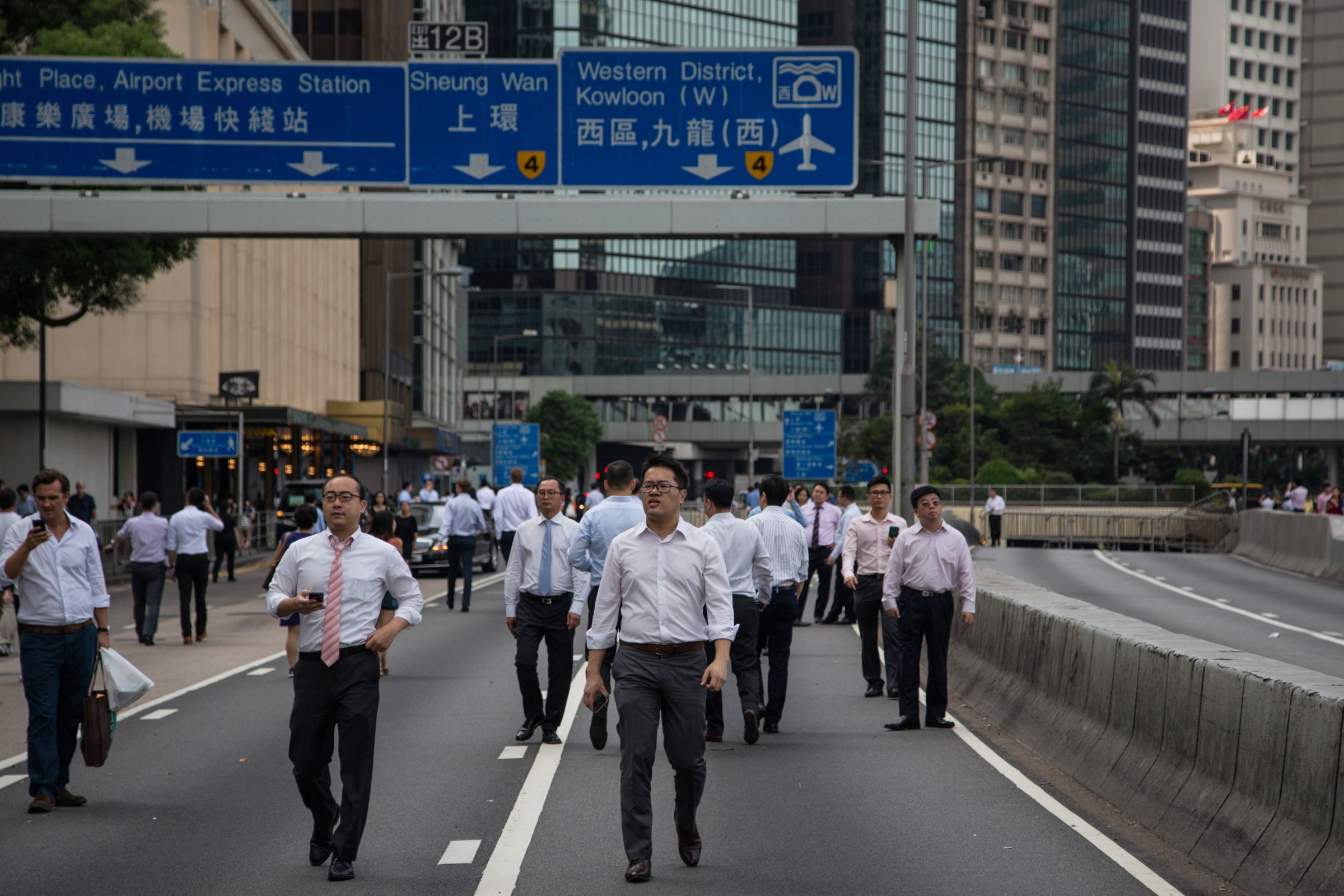
Updated: Oct. 4, 2014, 6:30 a.m. E.T.
As protests in Hong Kong pass the one-week mark, members of Hong Kong’s business and financial communities are weighing their support for the pro-democracy demonstrations that have brought some of this financial hub’s commercial sectors to a standstill.
According to the South China Morning Post, Hong Kong’s Financial Secretary, John Tsang Chun-wah, said that while the financial market is still unhurt—the Hang Seng Index climbed 0.6 per cent on Friday—the bourse could nevertheless smart from a loss of confidence should the demonstrations continue.
“Up to now there is still no indication that the protest will end in the near future,” said Tsang. “If the protest drags on, the social conflict may become more acute,” he warned.
Beijing is unwilling to answer the chief demand of the tens of thousands of protesters that have massed in Hong Kong’s streets for the past week. China, they say, must allow Hong Kong voters to nominate candidates for position of Chief Executive—the city’s highest office—and permit direct elections of the same.
The central government wants the nominees to be vetted by a committee perceived as loyal to the Chinese government. Indeed, China’s ruling Communist Party appears to be banking on protesters hemorrhaging public support as the mass sit-ins continue to clog major commercial arteries, shutter businesses, divert traffic, and interrupting the normally incessant hum of Hong Kong’s commerce.
On Friday evening, a mob attack on peaceful protesters in Mong Kok also raised fears that Hong Kong’s usually orderly streets are becoming dangerous. Both this prospect, as well as the thought that the Occupy protests will continue indefinitely, are unacceptable to the business community.
The Hong Kong Federation of Restaurants and Related Trades said at a press conference on Friday that business over the last week—typically a revenue bonanza, with its two public holidays—is projected to show a 30% decline from last year.
The U.S. and U.K. consulates in Hong Kong on Friday issued emergency messages after the violence in Mong Kok, reiterating earlier warnings that citizens avoid public demonstrations.
Meanwhile, Beijing on Thursday suspended travel permits for mainlanders seeking to visit Hong Kong, heralding a possible tanking of tourism revenue in the cosmopolitan city. Mainland Chinese visitors plug about $38 billion into Hong Kong’s economy, the Wall Street Journal reports.
But other business voices on Saturday expressed continued support for the sit-ins and seem confident that serious damage to Hong Kong’s market was still far-off.
“I do note that neither the Occupy Wall Street demonstrations nor the London riots in 2011 had noticeable long-term impact on those financial centers,” says David Cook, a professor of economics at the Hong Kong University of Science and Technology, in an email. “I am confident Hong Kong will continue to be a safe place to do business and the rule of law will remain strong.”
Edward Chin, a hedge-fund manager, as well as the founder of a group of 80 people from the financial industry who support the protests, said on Saturday afternoon that his backing had not waned.
“Of course, as a selfish Hong Konger why would I care?” says Chin, who has attended the protests each day since they began, including the set-upon demonstrations in Mong Kok on Friday night.
“But we are fighting for core values here,” he says, citing the long-term benefits to Hong Kong’s young people of electing a government responsive to their interests. “This is about getting a clean government.”
Shaheen Budhrani, 24, co-founder of a company that distributes craft beer to upscale bars and restaurants, many of them located near the protest hotspot in Central district, said several deliveries that were supposed to go out on Monday and Tuesday were not made until Friday.
“If you’re a bar and you don’t have enough beer on tap, it’s a big loss for them and a big loss for us,” he said. But Budhrani also said he supported the protesters—as do most of his clients. “They understand what’s going on at the moment,” he says. “It’s for the greater good, and it’s out of anyone’s control.”
Meanwhile, hotels in areas near major protest encampments on Saturday remained measured in their assessment of the situation.
A spokesperson for the elegant Mandarin Oriental—located on Connaught Road, the scene of tear gassing and running battles between police and protesters a week ago—said it was “business as usual” at the hotel, though staff there “will continue to monitor the situation closely.”
At the Langham Place Hotel, a mere block away from the Mong Kok protest site, occupancy was nearly 100% Friday night and was expected to be about 95% on Saturday night, a spokesperson said. She said there had been some cancellations since Sunday, when students arrived in Mong Kok to occupy a key intersection
“We do not have the number of visitors being affected. However, it is believed that some visitors will postpone or cancel their plans to visit Hong Kong for the time being,” said Hong Kong Tourism Board spokeswoman Amy Lam.
—With reporting by Rishi Iyengar/Hong Kong
More Must-Reads from TIME
- Donald Trump Is TIME's 2024 Person of the Year
- Why We Chose Trump as Person of the Year
- Is Intermittent Fasting Good or Bad for You?
- The 100 Must-Read Books of 2024
- The 20 Best Christmas TV Episodes
- Column: If Optimism Feels Ridiculous Now, Try Hope
- The Future of Climate Action Is Trade Policy
- Merle Bombardieri Is Helping People Make the Baby Decision
Write to Elizabeth Barber / Hong Kong at elizabeth.barber@timeasia.com